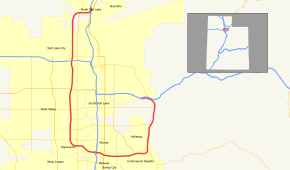I-215 (UT)
| Interstate 215 | ||||
|---|---|---|---|---|
 |
||||
| Route information | ||||
| Defined by Utah Code §72-4-127 | ||||
| Maintained by UDOT | ||||
| Length: | 28.946 mi (46.584 km) | |||
| Existed: | 1963 – present | |||
| Major junctions | ||||
| Beltway around Salt Lake City | ||||
| CCW end: |
|
|||
|
|
||||
| CW end: |
|
|||
| Highway system | ||||
|
||||
Interstate 215 (I-215), also known locally as the belt route or two-fifteen, is an auxiliary interstate in the U.S. state of Utah that forms a 270-degree loop around Salt Lake City and many of its suburbs. The route begins at the mouth of Parley's Canyon at a junction with I-80 east of the city center, and heads south through the edge of the Salt Lake City metropolitan area's eastern suburbs of Millcreek, Holladay, and Cottonwood Heights. It continues west through Murray before turning north again, passing through the city's first-ring western suburbs of Taylorsville and West Valley City. It then enters North Salt Lake and Davis County for a short distance before reaching I-15 northwest of the city center.
The interstate was proposed in the mid-1950s, along with I-15 and I-80 through Salt Lake City. At the time, only the western portion of the belt route was assigned as I-215. The eastern portion of the belt route was designated Interstate 415. However, the I-415 designation was scrapped to provide a single route number for the entire route in 1969, with the I-215 designation covering the complete belt route. The freeway was constructed in segments, beginning with a section completed in 1963 from Redwood Road in North Salt Lake to 2100 North near the airport. Originally planned to be complete in the mid-1970s, challenges from citizens' groups over environmental impact statements led to the completion of the last section of I-215 in 1989 between 6200 South and 4500 South in Holladay.
...
Wikipedia

